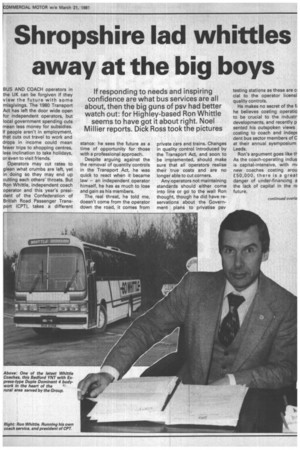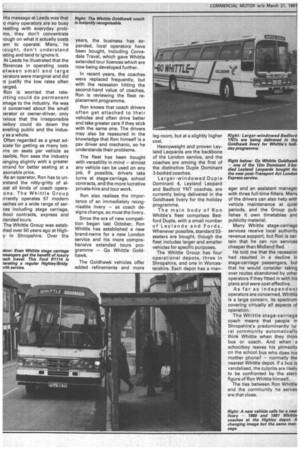Shropshire lad whittles away at the big boys
Page 31

Page 32

If you've noticed an error in this article please click here to report it so we can fix it.
If responding to needs and inspiring confidence are what bus services are all about, then the big guns of psv had better watch out: for High ley-based Ron Whittle seems to have got it about right. Noel Millier reports. Dick Ross took the pictures
BUS AND COACH operators in the UK can be forgiven if they view the future with some misgivings. The 1980 Transport Act has left the door wide open for independent operators, but local government spending cuts mean less money for subsidies. if people aren't in employment, that cuts out travel to work and drops in income could mean fewer trips to shopping centres, less inclination to take holidays, or even to visit friends.
Operators may cut rates to glean what crumbs are left, yet in doing so they may end up cutting each others' throats. But Ron Whittle, independent coach operator and this year's president of the Confederation of British Road Passenger Transport (CPT), takes a different stance: he sees the future as a time of opportunity for • those with a professional approach.
Despite arguing against the the removal of quantity controls in the Transport Act, he was quick to react when it became law — an independent operator himself, he has as much to lose and gain as his members.
The real threat, he told me, doesn't come from the operator down the road, it comes from private cars and trains. Changes in quality control introduced by the Transport Act, and soon to be implemented, should make sure that all operators realise their true costs and are no longer able to cut corners.
Any operators not maintaining standards should either come into line or go to the wall Ron thought, though he did have reservations about the Government plans to privatise psv testing stations as these are ci cial to the operator licensi quality controls.
He makes no secret of the lc; he believes costing operatic to be crucial to the industr developments, and recently p sented his outspoken views costing to coach and indepE dent bus sector members of C at their annual sysmposium Leeds.
Ron's argument goes like ti•-• As the coach-operating indus is capital-intensive, with mi new coaches costing arou E5 0,0 0 0, there is a great danger of under-financing a the lack of capital in the nE future. His message at Leeds was that o many operators are so busy restling with everyday probms, they don't concentrate .fough on what it actually costs em to operate. Many, he rought, don't understand )sting and tend to ignore it.
At Leeds he illustrated that the fferences in operating costs etween small and large )erators were marginal and did )t justify the low rates often farged.
Ron is worried that rateatting could do permanent 3mage to the industry. He was yt concerned about the small )erator or owner-driver, only ixious that the irresponsible mboy could do down the avelling public and the indusy as a whole.
Often regarded as a great ad)cate for getting as many botrms on seats per vehicle as Dssible, Ron sees the industry ranging slightly with a greater .mand for better seating at a asonable price.
As an operator, Ron has to un Nstand the nitty-gritty of allost all kinds of coach operaons. The Whittle Group irrently operates 57 modern )aches on a wide range of serces including stage carriage, ;hool contracts, express and (tended tours.
The Whittle Group was estabthed over 50 years ago at Highy in Shropshire. Over the years, the business has expanded, local operators have been bought, including Corvedale Travel, which gave Whittle extended tour licences which are now being developed further.
In recent years, the coaches were replaced frequently, but with the recession hitting the second-hand value of coaches, Ron is reviewing the fleet replacement programme.
Ron knows that coach drivers often get attached to their vehicles and often drive better and take greater care if they stick with the same one. The drivers may also be reassured in the knowledge that Ron himself is a psv driver and mechanic, so he understands their problems.
The fleet has been bought with versatility in mind — almost any vehicle can be used on any job. If possible, drivers take turns at stage-carriage, school contracts, and the more lucrative private-hire and tour work.
Ron also realises the importance of an immediately recognisable livery — as coach designs change, so must the livery.
Since the era of new competition began last October, Ron Whittle has established a new brand-name for a new London service and his more comprehensive extended tours programme — Go Whittle Goldhawk.
The Goldhawk vehicles offer added refinements and more eg-room, but at a slightly higher cost.
Heavyweight and proven Leyland Leopards are the backbone of the London service, and the coaches are among the first of the distinctive Duple Dominant 3-bodied coaches.
Larger-windowed Duple Dominant 4, Leyland Leopard and Bedford YNT coaches, are currently being delivered in the Goldhawk livery for the holiday programme.
The main body of Ron Whittle's fleet comprises Bedford Duple, with a small number of Leylands and Fords. Whenever possible, standard 53seaters are bought, though the fleet includes larger and smaller vehicles for specific purposes.
The Whittle Group has four operational depots, three in Shropshire, and one in Worcestershire. Each depot has a man ager and an assistant manager with three full-time fitters. Many of the drivers can also help with vehicle maintenance at quiel periods, and the Group publishes it own timetables and publicity material.
Many Whittle stage-carriage services receive local authority revenue support, but Ron is certain that he can run services cheaper than Midland Red.
He told me that the recession had resulted in a decline in stage-carriage passengers, but that he would consider taking over routes abandoned by other operators if they fitted in with his plans and were cost-effective.
As far as independent operators are concerned, Whittle is a large concern, its spectrum covering virtually all aspects of operation.
The Whittle stage-carriage coach means that people in Shropshire's predominantly rural community automatically think Whittle when they think bus or coach. And when a schoolboy leaves his plimsolls on the school bus who does his mother phone? — normally the nearest Whittle depot. If a bus is vandalised, the culprits are likely to be confronted by the stern figure of Ron Whittle himself.
The ties between Ron Whittle and the community he serves are that close.












































































































